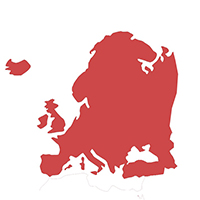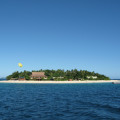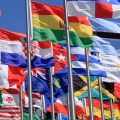Pacific Leaders Draw Line in the Sand
Kya Lal | December 8, 2015.
The Paris climate summit is breaking records and setting milestones like none before it. Speaking to a record number of world leaders and heads of governments, UN Secretary General Ban Ki Moon reminded them of the importance of this meeting.
“Political momentum like this may not come again. You have the power to secure the well-being of this and succeeding generations. You have the moral and political responsibility for this world and succeeding generations. History is calling, I urge you to answer with courage and vision,” said Ban.
Of these 150 leaders present, the 22 countries and territories of the Pacific islands were represented by leaders from 11 countries. Why are these 11 small nations so important? They are some of the strongest voices calling for immediate and genuine action on climate change. The comments from Pacific leaders over the past week reveals the fact that they have a lot to lose at COP21, but also a lot to gain. If they manage to keep a consistent and cohesive stance, the Pacific nations could prevent the Association of Small Island States (AOSIS) from fracturing at the eleventh hour, as happened in Lima at last year’s conference.
There were numerous common themes in the speeches of leaders on Leaders Day, notably about the impacts on their islands already being felt. While leaders were at pains to point out that the Pacific is the world’s smallest contributor to climate change, they all highlighted what they were doing to contribute ‘their share’ through their national efforts. The Pacific stance in Paris is essentially a reiteration of the Suva Declaration produced at the Pacific Islands Development Forum, earlier this year. Pacific leaders are drawing lines in the sand over a few core issues.
Capping Warming at 1.5°C
The stance on a 1.5°C temperature goal by Pacific leaders here in Paris has been unwavering. With Tuvaluan Prime Minister Enele Sopoanga describing 2°C as “a European obsession.” The reality is that many Pacific nations are face real and increasingly severe impacts of climate change.
“A European obsession”
Islands such as Kiribati, the Marshall Islands and Tuvalu are facing a future where they may no longer exist. While Kiribati President Anote Tong highlighted earlier this week that even 1.5°C won’t be adequate to keep the Pacific safe. Sopoanga later stressed that “anything less than 1.5°C is the definition of our disappearance.” Of all their demands, the temperature goal is the one that the Pacific nations are most likely to fight the hardest for.
Loss and Damage
The second key and consistent ask from the Pacific caucus is a stand alone mechanism for climate related loss and damage. For the Pacific it’s not just an issue of preventing further climate change with a 1.5°C warming limit. It is also about adapting and mitigating to the impacts of climate change that have already taken place.
“Who will pay?”
As well as to address inevitable future impacts. President Baron Waqa of Nauru exhorted leaders: “After years of excess and wilful ignorance, the climate bill has finally come due. Who will pay?” Payment is a key issue within loss and damage. With the distinct likelihood that compensation for historical damages will be completely excluded from the final agreement, having been ruled out by many industrialised nations. Therefore what could eventuate is a further water-downed loss and damage mechanism, with compensation sacrificed by Pacific nations for it to be included in the text.
A Legally Binding Agreement
The call for a legally binding agreement to come out of Paris has been near universal from the Pacific leaders, with Tuvalu suggesting that anything less would be shameful. Leaving Paris with an agreement that isn’t binding would spell disaster, and increase the likelihood that other countries may renege on efforts. This would essentially undermine everything achieved or worked towards in Paris. But leaders may be setting themselves up for failure. The likelihood of a legally binding agreement has been slim to none from the beginning of this process.
Finance, Technology and Clean Energy
Though not entirely across the board, there has been a lesser call from some Pacific states for action on finance. Leaders are calling for financial accessibility and the loosening of bureaucratic barriers with the, most vulnerable at the top of the finance list, especially Small Island Developing States (SIDS) and Least Developed Countries (LDCs). This has also been coupled with the push for a transition to cleaner energy production and technology transfer.
Notable mentions
Beyond these demands, Pacific leaders have individually and collectively raised a few other key issues which could impact the Pacific AOSIS line. Support for the inclusion of Taiwan in the UNFCCC process by Kiribati, Marshall Islands, Palau and Nauru, could be a sticking point as negotiations progress, especially where China is concerned . While Kiribati alone also called for greater autonomy of Tokelau and for an international moratorium on new coal mines being opened, in line with the Suva Declaration. Additionally Papua New Guinea’s ongoing support for REDD+ here in Paris continues to be evident. With Fiji, Tuvalu and Kiribati also posing an interesting dynamic within coming days, as Fiji has reiterated its offer of relocation to both island neighbors, an offer warmly received.
The key demands from Pacific islands are some of the most contentious at the Paris summit. With everything to lose and everything to gain, the Pacific will be hardline in their demands. Whether the Pacific can collectively remain steadfast in their demands is yet to be seen.













comment